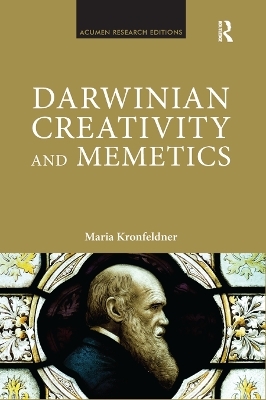
Darwinian Creativity and Memetics
Seiten
2019
Routledge (Verlag)
978-0-367-87220-5 (ISBN)
Routledge (Verlag)
978-0-367-87220-5 (ISBN)
Examines how Darwinism has been used to explain novelty and change in culture through the Darwinian approach to creativity and the theory of memes. This title shows that the analogies involved in these theories lead to claims that give either wrong or at least no new descriptions or explanations of the phenomena at issue.
The author examines how Darwinism has been used to explain novelty and change in culture through the Darwinian approach to creativity and the theory of memes. The first claims that creativity is based on a Darwinian process of blind variation and selection, while the latter claims that culture is based on and explained by units - memes - that are similar to genes. Both theories try to describe and explain mind and culture by applying Darwinism by way of analogies. The author shows that the analogies involved in these theories lead to claims that give either wrong or at least no new descriptions or explanations of the phenomena at issue. Whereas the two approaches are usually defended or criticized on the basis that they are dangerous for our vision of ourselves, this book takes a different perspective: it questions the acuteness of these approaches. Darwinian theory is not like a dangerous wolf, hunting for our self image. Far from it, in the case of the two analogical applications addressed in this book, Darwinian theory is shown to behave more like a disoriented sheep in wolf's clothing.
The author examines how Darwinism has been used to explain novelty and change in culture through the Darwinian approach to creativity and the theory of memes. The first claims that creativity is based on a Darwinian process of blind variation and selection, while the latter claims that culture is based on and explained by units - memes - that are similar to genes. Both theories try to describe and explain mind and culture by applying Darwinism by way of analogies. The author shows that the analogies involved in these theories lead to claims that give either wrong or at least no new descriptions or explanations of the phenomena at issue. Whereas the two approaches are usually defended or criticized on the basis that they are dangerous for our vision of ourselves, this book takes a different perspective: it questions the acuteness of these approaches. Darwinian theory is not like a dangerous wolf, hunting for our self image. Far from it, in the case of the two analogical applications addressed in this book, Darwinian theory is shown to behave more like a disoriented sheep in wolf's clothing.
Maria Kronfeldner has a Junior Professorship in Philosophy at the University of Bielefeld, Germany.
1. Light will be thrown 2. Darwinian principles 3. The origin of novelty 4. The argument from guided variation 5. The units of culture 6. Memes or minds
| Erscheinungsdatum | 16.12.2019 |
|---|---|
| Verlagsort | London |
| Sprache | englisch |
| Maße | 156 x 234 mm |
| Gewicht | 453 g |
| Themenwelt | Geisteswissenschaften ► Philosophie |
| Naturwissenschaften ► Biologie ► Evolution | |
| ISBN-10 | 0-367-87220-X / 036787220X |
| ISBN-13 | 978-0-367-87220-5 / 9780367872205 |
| Zustand | Neuware |
| Haben Sie eine Frage zum Produkt? |
Mehr entdecken
aus dem Bereich
aus dem Bereich
Komplette Neuübersetzung. Mit einem Nachwort von Josef H. Reichholf.
Buch | Hardcover (2018)
Klett-Cotta (Verlag)
CHF 67,20
Wie die Vernichtung der Arten unser Überleben bedroht - Der …
Buch | Softcover (2023)
Penguin (Verlag)
CHF 20,95


